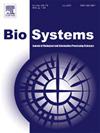Quantum information theoretic approach to the hard problem of consciousness
IF 2
4区 生物学
Q2 BIOLOGY
引用次数: 0
Abstract
Functional theories of consciousness, based on emergence of conscious experiences from the execution of a particular function by an insentient brain, face the hard problem of consciousness of explaining why the insentient brain should produce any conscious experiences at all. This problem is exacerbated by the determinism characterizing the laws of classical physics, due to the resulting lack of causal potency of the emergent consciousness, which is not present already as a physical quantity in the deterministic equations of motion of the brain. Here, we present a quantum information theoretic approach to the hard problem of consciousness that avoids all of the drawbacks of emergence. This is achieved through reductive identification of first-person subjective conscious states with unobservable quantum state vectors in the brain, whereas the anatomically observable brain is viewed as a third-person objective construct created by classical bits of information obtained during the measurement of a subset of commuting quantum brain observables by the environment. Quantum resource theory further implies that the quantum features of consciousness granted by quantum no-go theorems cannot be replicated by any classical physical device.
用量子信息理论解决意识的难题
意识的功能理论,建立在无意识的大脑执行特定功能产生意识体验的基础上,面临着解释为什么无意识的大脑会产生任何意识体验的意识难题。经典物理定律的决定论使这一问题更加严重,这是由于在大脑运动的确定性方程中没有作为物理量存在的突现意识缺乏因果效力造成的。在这里,我们提出了一种量子信息理论的方法来解决意识的难题,避免了所有涌现的缺点。这是通过第一人称主观意识状态与大脑中不可观察的量子态向量的还原识别来实现的,而解剖学上可观察的大脑被视为第三人称客观结构,由测量环境中可观察的通勤量子大脑子集时获得的经典信息创建。量子资源理论进一步暗示,量子不走定理赋予的意识的量子特征不能被任何经典物理设备复制。
本文章由计算机程序翻译,如有差异,请以英文原文为准。
求助全文
约1分钟内获得全文
求助全文
来源期刊

Biosystems
生物-生物学
CiteScore
3.70
自引率
18.80%
发文量
129
审稿时长
34 days
期刊介绍:
BioSystems encourages experimental, computational, and theoretical articles that link biology, evolutionary thinking, and the information processing sciences. The link areas form a circle that encompasses the fundamental nature of biological information processing, computational modeling of complex biological systems, evolutionary models of computation, the application of biological principles to the design of novel computing systems, and the use of biomolecular materials to synthesize artificial systems that capture essential principles of natural biological information processing.
 求助内容:
求助内容: 应助结果提醒方式:
应助结果提醒方式:


